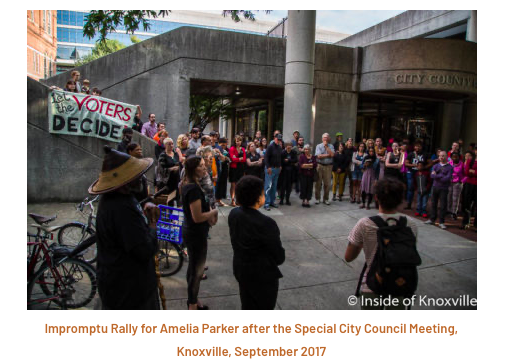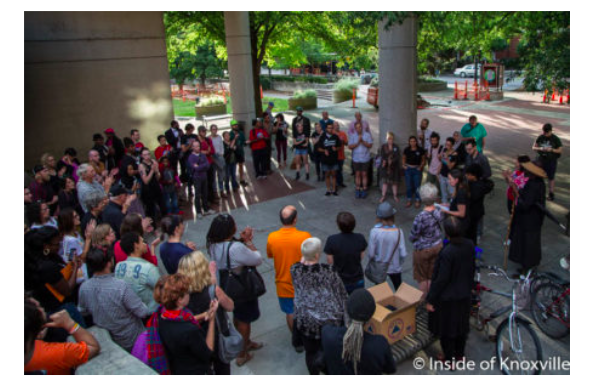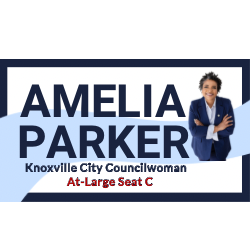

The Details of the 2017 City Council Tie Between Amelia Parker and Harry Tindell and Lessons Learned
On August 29, 2017, the City of Knoxville held a primary election. According to the city’s charter, the top two candidates from each race move on to the general election.
On election night, we watched the results come in with bated breath. First, they published the absentee ballots and early voting results to their website. Then came the precinct reports, and with 100% reporting, Amelia Parker was in second place, 21 votes ahead of Harry Tindell. After about a half-hour celebration, however, the website was refreshed with new results that showed a tie between Amelia and Harry at 488 votes each.
A group of individuals from Amelia’s campaign left the celebration to head to the Election Commission. However, only Gloria Johnson remained at the election commission. Gloria arrived at the commission following the updated numbers also concerned with what had caused the discrepancy in the count. Commissioners and staff had left for the evening by the time we arrived. Therefore, we went home and returned the next morning (8/30) to try and understand what happened.
The election commission staff, not including Cliff Rodgers who had not arrived yet, informed us that the absentee ballot machine they use was not able to read half of the absentee ballots’ bar codes and spit them out, so they counted the rejected ones by hand and added that number to what the machine had counted. They said that they had entered in the first set of absentee/early ballots before the precincts data came in, but then they stopped once the precinct data came in to update the website with election day information, then they finished entering in the hand-counted absentee ballots. When asked if they were certain that the hand counted ballots did not include any ballots already counted by the machine, they were not able to answer with certainty.
That same morning, we also asked about another concern we had from Election Day. Amelia received reports from two voters who live out in the county but are somehow annexed into her district, saying they were not sure where they could vote. One of Amelia's supporters called the election commission at 4:30 p.m. on election day and got confirmation from a woman there that yes, that precinct was open out in the county (on Strawberry Plains). But the voters went out to check and there was no one there and no signs directing voters to an alternative voting location. When we asked about this on Wednesday morning, August 30, none of the women who worked in the office admitted they remembered any such call from the previous day.
Calling for a Recount:
On August 30th, we also asked the election commission staff, specifically Assistant Administrator Chris Davis, about the legal statute we found, TCA, 2-17-117 regarding recounts, specifying that "any court, primary board, legislative body, or tribunal having jurisdiction of an election" had the power to call for a recount if there was a) a tie vote or b) machine malfunction, both of which were the case here.
Here is the text:
T. C. A. § 2-17-117
§ 2-17-117. Recounts
(a) Any court, primary board, legislative body, or tribunal having jurisdiction of an election contest pursuant to this chapter may order a recount of the ballots under any of the following circumstances:
(1) A tie vote;
(2) An indication of fraud if the number of votes affected would be sufficient to change the result of the election;
(3) A malfunction of a voting machine or tabulator if the number of votes affected would be sufficient to change the result of the election; or
(4) In any other instance the court or body with jurisdiction of a contested election finds that a recount is warranted.
(b) Any recount ordered by this section shall be a complete recount of all ballots cast in such election.
(c) The court or body with jurisdiction of a contested election shall determine if the recount shall be conducted by hand or with automated tabulators.
They looked at this statute that we had pulled up on someone’s phone and then stated that they did not know about the statute, and that the only way there would be a recount is if Amelia filed a lawsuit after the election vote was certified on September 15, which she would have five days to do after certification.
The Runoff Option:
Chris also told us that day that the City Council had the power to call for a runoff to break the tie, and that his opinion was that it would effectively mean a three way runoff in November. Cliff Rogers also initially said this was his opinion about how the tie should be broken. However, the city attorney was saying that this would violate the charter specifying that the top two vote getters move forward to the general election, and this became pretty much general consensus over the next week.
Again, we found a relevant statute:
§ 2-8-111. Tie votes
If there is a tie vote between the two (2) or more persons having the highest number of votes for an office, the state election commission shall cast the deciding vote except that:
(1) The county legislative body may cast the deciding vote for offices filled by the votes of a single county or civil district, or, in the alternative, the legislative body may by resolution call for a run-off election between the tied candidates;
(2) The municipal legislative body shall cast the deciding vote for municipal offices, or, in the alternative, the legislative body may by resolution call for a run-off election between the tied candidates;
(3) The governor shall cast the deciding vote for representatives in congress;
(4) The election shall be void if it is for senator in congress, and the governor shall immediately issue an order directing the holding of a special election for the office; and
(5) The general assembly in joint convention shall cast the deciding vote for governor.
We found out that this law had been altered fairly recently, perhaps 2013, when the state legislature realized that it was fairly undemocratic to make the municipal body break the tie, and added in that second option that they could call for a runoff election. However, from the morning after the election, we were being told by Cliff Rodgers and Chris that there was not enough time to hold a runoff election between August 30 and November, and there was not going to be enough time to resolve a three way general election between when the vote was certified on September 15, and September 21, which was the deadline by which Cliff Rodgers wanted to send out military ballots. (Rogers said this was his deadline, but later admitted that there was actually a month of leeway – he just wanted the military servicemen to have enough time.) In other words, although the state legislature has provided the option of some kind of runoff, everyone was telling us that actually conducting such a runoff wasn't practicable in the amount of time we had.
Legal advisor Rob Frost was saying all along this wouldn’t work and that there would be either a “coin toss” or the city council would just vote on their favorite to proceed. They said it would require a change in the city charter to have 3 people in the general election from one district, and that could only be done in even years.
Provisional Ballots:
Also on August 30th, we inquired about provisional ballots. We were informed that there were four provisional ballots, but they told us various things about which district they were in: that there were no provisional ballots for District 4, that they did not know whether there were any provisional ballots for district 4, or that they did not expect any provisional ballot to make a difference in this tie. The provisional ballot committee (the same group of people as the absentee ballot committee, and the same group as the election commission itself) met the afternoon of August 30 to review the four provisional ballots, and one of them did turn out to be from Amelia's district. However, they sent a request to the state for more information about whether the voter had attempted to register, and by the next day, it was decided that this provisional ballot would not be counted.
City Council Breaks the Tie:
On Sept 1, Friday afternoon, Amelia got notice of a public special City Council meeting to be held to decide how to resolve the tie and to break it, on Sept 6. Amelia was asked to make a 5-minute presentation about why she should be chosen.
At that meeting on September six, Cliff Rogers said there HAD been time to schedule a runoff if he had started working on it the morning after the election, but that he hadn’t, so they’d run out of time. This was very different than what he’d said up till that point. I have audio of this meeting.
Former councilman Dan Brown asked Mr. Rodgers if there was any way three people could be on the ballot and Rodgers said yes, if one person ran as a write-in. They then decided to just vote themselves, and voted unanimously for Harry Tindell.
Minutes: http://knoxvillecitytn.iqm2.com/Citizens/FileOpen.aspx?Type=12&ID=1195&Inline=True
Article: http://knoxfocus.com/2017/09/knoxville-focus-september-11-2017/
On Sept 15, members of Amelia’s campaign attended the vote certification and mentioned the statute that should have allowed the Election Commission to conduct a recount. Commissioner Cassandra Stuart, who was replaced on Commission by Tammy Pasouisis, asked for clarification regarding the statute. Cliff Rodgers said we had a “different interpretation of the law” and that only if Amelia filed a lawsuit could there be a recount. They certified the vote one minute later. Following the vote, back in Cliff’s office, Amelia and campaign members talked again with Cliff about legal observers. Cliff said we could have someone sequestered with the absentee ballot committee all day, but that we would have to get a court order to have a legal observer present in the “small room” where they will enter in the election-day precinct information.
Here’s the legal language on poll watchers: http://www.knoxcounty.org/election/pdfs/poll_watchers.pdf
Following our discussion with Cliff, we contacted the Southern Coalition for Social Justice and secured pro bono services from a lawyer in their election justice project. In October, our attorney, Laura Wright, sent a letter to the Election Commission, stating:
We write to you on behalf of Amelia Parker, Knoxville City Council write-in candidate for District 4, and city residents who support her. It has come to our attention that the Knox County Election Commission refuses to grant Ms. Parker’s request to have poll watchers present in the tallying room for the general election on November 7, 2017, absent a court order. This is contrary to both Tennessee state law and Knox County’s own Poll Watcher Information. Moreover, the Election Commission has been unwilling to supply Knoxville voters with important election resources; specifically, paper ballots, and online access to accurate precinct information for all Knoxville voters.
Cliff responded:
Pursuant to your request, this email shall serve to confirm the position of the Knox County Election Commission (KCEC) with respect to the three (3) issues set forth in your letter to the KCEC dated October 17, 2017, as discussed in our telephone conversation on Monday of this week. As you are aware, I had previously discussed all of these issues with State Election Coordinator Mark Goins earlier in the day.
I. PAPER BALLOTS
In your letter, you have relied on subpart (a) of Tenn. Code Ann. 2-7-117 to demand that the KCEC provide a paper ballot to any voter who might request one in order to write-in Amelia Parker’s name for City Council District 4. Subpart (a) of that statute governs those older voting machines which had no mechanism to allow a voter to cast a write-in ballot on that machine. By contrast, subpart (b) of that statute makes it clear that voting machines which allow for write-in votes to be cast on them will be governed by “rules and regulations promulgated by the coordinator of elections.” For your convenience, I have attached hereto a copy of Promulgated Rule No. 1360-02-13-.19 pertaining to the use of write-in ballots on certified voting machines such as ours. This promulgated rule makes it abundantly clear that election commissions are not required to provide paper ballots to voters for write-in candidates since our voting system has been certified by the State.
II. POLL WATCHERS ON ELECTION DAY
In your letter, you have relied on Tenn. Code Ann. 2-7-104 to request a poll watcher in our tally room on Election Day/Night. As we discussed, your reliance on that statute is misplaced since the tally room is not, under any interpretation of the statute, a polling place governed by this statute. Rather, the tally room is simply the location where—after the polls are closed—we insert the mobile ballot boxes (the “MBBs”) into the tally machine which will then read and display the results from the polling places. Thus, there are no ballots present, as your letter intimates, which may be “inspect[ed]…while being called and counted.” So, even though Ms. Parker has no statutory right to have a poll watcher in a non-polling place location, the issue as to whether a candidate has a right to have a representative there is a different matter. And it is a request which no candidate has previously made in Knox County.
Neither Coordinator Goins nor I are presently aware of any law on who is allowed in or about the tally room. Consequently, I offered to you, as a compromise, that the KCEC would allow a representative of Ms. Parker’s campaign to stand outside the doorway of the tally room to observe and hear everything which is transpiring there. As we discussed, there is no more room for anyone else to be physically present in this small room, the size of which hardly rises to the dignity of a walk-in closet. To be more precise, the tally room is about 13 ft. deep and almost 10 ft. wide. It has computers on both sides eating into that limited space. On Election Night, we will have three (3) folks sitting on the right (two (2) election commissioners and one (1) staff, Lorrhonda Myers) and three (3) folks sitting on the left from Knox County IT (to assist with “pushing out” the vote totals onto the internet after they have been tallied). Then, as the evening progresses, we will have two (2) more election commissioners intermittently squeezed into the middle of the room as they transport the MBBs in sealed envelopes from the Small Assembly Room to the tally room. And that is the very reason why I told Louise Seamster on or about September 15th that she would have to obtain a court order for her or someone else from Ms. Parker’s campaign, in effect, to camp out in the middle of that cramped room under these circumstances.
Nevertheless, I have offered the above compromise as a way for Ms. Parker’s representative to personally observe absolutely everything transpiring there without encroaching upon what little space remains. Of course, as we also discussed, my other concern is what precedent this compromise is setting since there is probably one good spot at best—maybe two—outside the doorway of the tally room to observe the activities there. I can only hope that yours is the only request. And it is for that reason that Coordinator Goins requested that I receive a letter from you making that request official.
III. POLLING PLACE INFORMATION FOR CITY ANNEXED VOTERS
Finally, in your letter, you requested that our website be updated so that if city annexed voters enter their address in the Voting District Search feature of our website provided by KGIS to determine where to vote on November 7th, then our website will indicate their city precinct as opposed to their county precinct to avoid being sent, in effect, to a polling place which will not be open on Election Day for the City Election. To that end, I discussed this issue regarding KGIS with Supervisor Keith Stump on Monday. Although Mr. Stump believes that this update can be accomplished, the person who is in charge of this facet of KGIS is out of the office until Thursday so we won’t know for sure until then or perhaps a little later. I will, of course, keep you posted. Additionally, although not specifically requested by you, the KCEC provided data about city annexed voters to the State on Monday at its request so that its GoVoteTN app can hopefully be updated in a similar manner. Again, we will keep you posted.
For the record, I wanted to point out again that the KCEC has mailed postcards to all active city annexed voters as required by law informing them of this polling place change. Tenn. Code Ann. 2-3-101 (a) (2) (B) and (C). Furthermore, as we discussed, neither my staff nor I have ever received any complaints from actual voters who have had any issue about where to vote on election day as a city annexed voter. When they call our office about where to vote, they are directed to the correct polling place.
Moving forward:
In 2019, Amelia Parker was elected to an at-large seat on the Knoxville City Council. In 2022, she is introducing a charter amendment to prevent the need for city council to determine who moves on to the general election ballot in the case of a tie.
The charter amendment will be presented to the city council at their meeting on June 28, 2022 for first reading. If the charter amendment is approved after two readings by the city council, the measure will go before the voters on the November ballot.
See the text of the amendments and Amelia's reasoning for bringing it forward below.
After experiencing the city council’s tie breaker process in 2017, a simple solution was presented to me that would have prevented the need for city council to choose the candidate to move forward to the general election ballot. The charter amendment I am proposing allows the candidates with the two highest number of votes to move forward to the ballot (rather than the two candidates with the highest number of votes). This small change in language would prevent the city council from having to break a tie in the primary election. If a tie were to occur during the general election, the city council has the option to call for a recount or hold a special election to determine a winner. In the primary, the city council could call for a recount but there is no time to hold a runoff election that service members would be able to participate in. Therefore, currently, the council must take a vote or flip a coin to determine who moves on to the general election in the case of a tie in the primary.
Proposed charter amendments:
The charter amendments I am proposing would change the language in Article VII. Section 707(B) and (C) of the charter for both “at large” and “district” members of council to allow the candidates receiving the two highest number of votes to move on to the general election rather than the two candidates receiving the highest number of votes.
Key state provisions:
- TCA § 2-17-117 (Recounts) states that any court, primary board, legislative body, or tribunal having jurisdiction of an election contest pursuant to this chapter may order a recount of the ballots ...in the case of a tie vote.https://law.justia.com/codes/tennessee/2019/title-2/chapter-17/section-2-17-117
- TCA § 2-8-111 (Tie votes) states that if there is a tie vote between the two (2) or more persons having the highest number of votes for an office, the state election commission shall cast the deciding vote except that ... the municipal legislative body shall cast the deciding vote for municipal offices, or, in the alternative, the legislative body may by resolution call for a run-off election between the tied candidates.https://law.justia.com/codes/tennessee/2010/title-2/chapter-8/2-8-111
SHALL ARTICLE VII, SECTION 707(B) OF THE CHARTER OF THE CITY OF KNOXVILLE, ENTITLED, “MEMBERS OF COUNCIL-[BY] DISTRICT” BE AMENDED SO AS TO CHANGE THE CANDIDATES PLACED ON THE REGULAR ELECTION BALLOT FROM THE TWO (2) CANDIDATES RECEIVING THE HIGHEST NUMBER OF VOTES IN EACH DISTRICT TO THE CANDIDATES RECEIVING THE TWO (2) HIGHEST NUMBER OF VOTES IN EACH DISTRICT, ALL AS MORE FULLY SET FORTH IN ORDINANCE No. __ OF THE CITY OF KNOXVILLE AS DULY PUBLISHED?
SHALL ARTICLE VII, SECTION 707(C) OF THE CHARTER OF THE CITY OF KNOXVILLE, ENTITLED, “MEMBERS OF COUNCIL-AT LARGE” BE AMENDED SO AS TO CHANGE THE CANDIDATES PLACED ON THE REGULAR ELECTION BALLOT FROM THE TWO (2) CANDIDATES RECEIVING THE HIGHEST NUMBER OF VOTES FOR EACH DESIGNATED AT LARGE SEAT TO THE CANDIDATES RECEIVING THE TWO (2) HIGHEST NUMBER OF VOTES FOR EACH DESIGNATED AT LARGE SEAT, ALL AS MORE FULLY SET FORTH IN ORDINANCE No. __ OF THE CITY OF KNOXVILLE AS DULY PUBLISHED?
See the referenced section of the charter at this link: https://library.municode.com/tn/knoxville/codes/code_of_ordinances?nodeId=PTITHCH_ARTVIIEL_707MAHOEL

